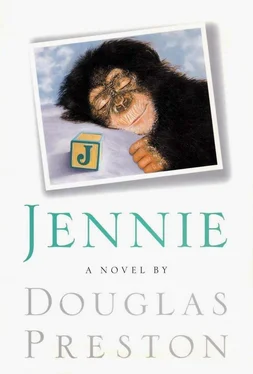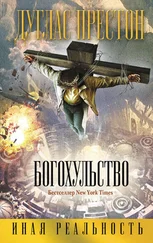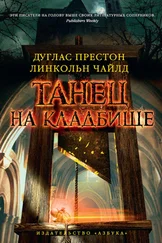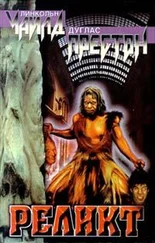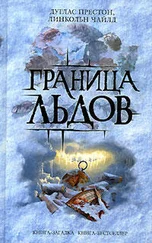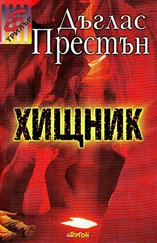The chimpanzee had been crawling around under my camp desk, patting the dusk and crooning softly to herself. I felt her fist on my pantleg and looked down in time to see her launch herself across the room, taking four or five quick wobbly steps before pitching forward onto her knuckles and then facedown in the dirt. This performance was followed by a triumphant gale of high-pitched hoots and cries, while she bounced up and down holding on to a table leg.
The rains began early. A few heavy drops slapped down through the leaves, the chimpanzee began screaming with displeasure (she hated rain), and soon it was as black as night. We arrived in Lukemba in a warm downpour, the mud streets running with water. Steam and cooking smoke rose from the conical thatched roofs. A wet chicken strutted around, and a tethered goat with a swollen udder forlornly watched us.
The peace lasted only a moment. Pouring out of the huts came the naked village children, their bellies swollen with kwashiorkor , their white teeth flashing, their pink throats showing behind their shouts. Incredibly enough, almost every child already had a dead specimen in hand, a toad, a spitted cane rat, a bird, a salamander, a big beetle, or splay-winged cricket. They hopped up and down and grabbed at my shirt, flapping and waving the dead animals in front of me, hollering out in Pidgin the most outrageous sums. Kwele immediately went into action, perhaps too enthusiastically, scolding, pushing the children back, waving about a big stick, grimacing and slapping down hands as they thrust dead specimens in my direction.
“Masa no want dis beef! Ha! Masa gone be angry! No want dis beef! Dis bad beef! Whaaaa!”
A group of men had gathered in the village square — a pool of mud surrounded by ancient bala trees — behind a large man in a white robe and embroidered skullcap, thatch umbrellas clustered over his head. He was the Mololo, the Lukemban chief. He met me with a large, wet hand and a brilliant smile, while his men rushed to shield me from the downpour, jostling each other and arguing as they held the umbrellas over my head.
“Na foine!” said the Mololo, in his rich, rolling voice. “Na foine ting dis! Welcome!” The crowd echoed “Welcome!” and he linked his arm with mine and we proceeded toward the big house at the edge of the square.
It was a welcome sight, an old colonial house with a large porch, a pitched roof, and an airy interior of small cool rooms opening one into the other. A heavy mass of bougainvillea twisted up the adzed tree trunks that supported the porch roof, and inside sat an enormous stone fireplace, an atavism of some turn-of-the-century colonial official.
After we went inside, Kwele took a stand at the doorway, brandishing his stick, poking back the children, while the rest of the expedition filed inside and piled their gear and specimens in the back. As most of the skeletal material was still “dirty,” the house soon filled with the smell of decaying flesh, augmented by the odor of wet people. It was a smell I had grown accustomed to years ago.
The Mololo seated himself opposite the fireplace and opened his palm toward a chair, giving me leave to sit. The officials stood in a respectful circle around us, steaming and dripping water. A bottle of Bombay gin appeared from underneath someone’s robe and was placed on the rattan table with a loud thump, along with two tumblers.
“We drink!” the Mololo said, filling each glass with care. While this was going on I had freed the chimpanzee from her carrying sling and she now climbed over my head and down my face, dropping into my lap.
We drained our glasses, as courtesy required, and the Mololo refilled them.
“Welcome!” he said again, immediately echoed by the men around him. “You get um good beef?”
“Yes, sir,” I said. “Lots of good beef. It’s been a good trip.”
“Na foine! We got um many hunter mans here, get you all good beef you want. We done been waiting.”
“Thank you, sir.” The Mololo had been very helpful on my previous trips, encouraging his people to comb the forest for specimens.
“Na whatee dis ting?” he said, leaning over at the chimpanzee. The animal sat up in my lap and peered at the Mololo.
“Wheee!” she said, and ducked down.
“I found her in the forest,” I said. “Her mother was killed by hunter man.”
“You savvay dis beef? When he go big, he done cause trouble, you watch um good!” He laughed and tossed back his glass. “Na whatee dat palaver for dis beef?”
“We call it a ‘chimpanzee.’ ”
“Timpansee! Na foine name.” He leaned over and looked at the little animal. With a solemn expression on her face, the little chimpanzee reached out and he enveloped her tiny hand in his and shook it.
“He shake um hand, like all de Masa!” The Mololo exploded with laughter. (“Masa” is the Pidgin term for any white man, and does not necessarily connote rank or respect.) “Dis beef gone grow into Masa for true!”
My work in Lukemba proceeded smoothly. Kwele organized the buying of the specimens. Every day at four o’clock, those villagers with dead animals would fill the dirt area in front of the house, and Kwele would wade through, swagger stick in hand, dismissing most of the people but sending those with unusual specimens up to the porch, one at a time, where they would lay their catch on the table.
As soon as a deal had been made the specimen would be carried around to the back, where it was immediately skinned and defleshed; the meat was given back to the seller, the skin pegged for tanning, and the fleshed-out skeleton dumped in one of several old bathtubs I kept as maceration vats.
The chimpanzee played under the table while the bargaining sessions went on, climbing the legs, dropping back to the floor, rolling around and hooting softly. Sometimes she would climb into my lap and suck on my buttons, and once in a while she would climb to the top of my head and sit there, surveying the world like a diminutive Chinese emperor. Her appearance on my head always caused an uproar from the ubiquitous crowd, who laughed and stamped their feet. Sometimes she would sneak under the table and lie in wait, ready to grab the feet of some unsuspecting African, usually with lively results. Then she would scream and retreat behind my chair.
We spent two months in Lukemba. It was remarkable to me how fast the chimpanzee grew and how quickly she lost her shyness. During the second month of our stay the children of the village would come by the house in the morning and squat outside the door calling out a word in Nala that I couldn’t quite understand. The chimp would be up and tumbling out the door like a bullet, and later I would see her running through the village with a laughing crowd of children.
When we first came to Lukemba, I had worried how the chimpanzee would fare with the dozens of vicious dogs that slunk and skulked around the town. But the village children teased the dogs mercilessly and I noticed that the chimp was a most enthusiastic participant in this game. The dogs, for their part, reacted to the chimpanzee as if she were a human child, whining and groveling whenever she swaggered by. I once saw the chimp threaten a dog with a stick and take away a piece of garbage it was eating.
One morning I asked Kwele what it was the children chanted at the chimp every morning.
“Dat be dis beef’s palaver,” Kwele said.
“What is the word? What does it mean?”
“Jen ikwa si go . It say, dis little beef, he stick out de hairs, make himself look bigger den he is.”
“I don’t understand.”
“You see dis beef, when he have de fear? Or he be angry? He stick out de hairs. Whoof! Like dis.” Kwele hunched up his arms and hunkered down in an imitation of a chimpanzee display of aggression.
Читать дальше
